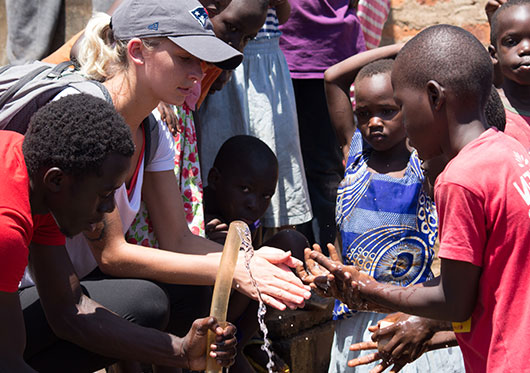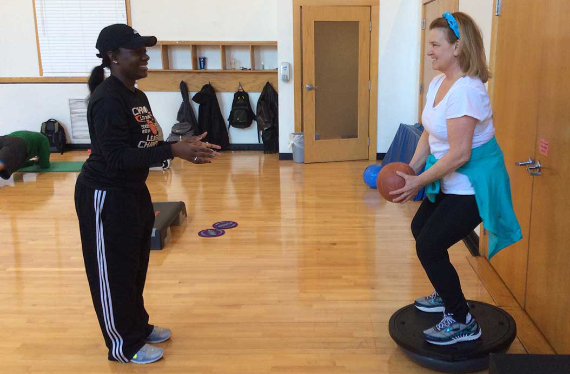When Massachusetts Governor Charlie Baker called on local college public health students to assist the Massachusetts Department of Public Health (DPH) in tracing COVID-19 cases to help contain the virus spread, 40 Regis College students were among those who quickly volunteered. The global pandemic and the partnership - a first-of-its-kind in the nation, according to the governor - provide an unexpected opportunity to learn and serve.
“This is the epitome of public health: having these institutions come together to work for a common goal,” said Laura Burke, dean of the School of Health Sciences at Regis.
Regis Director of Public Health Leslie Mandel initially proposed the idea of partnering with DPH to Regis faculty and staff. When Regis public health major Markina Ako-Brew ’21 heard about the opportunity to volunteer for the COVID - Regis initiative from a professor during class, she at first wondered if she was qualified. But once she hit “send” on the email she felt a sense of relief and excitement.
“COVID-19 is something that is going to change our world and I was excited to help the public health department to contain the spread of it,” says Ako-Brew, who has completed rigorous training and helping trace the spread of coronavirus cases. She is serving on the Academic Public Health Volunteer Corps, an initiative of over 1,900 public health students and professionals who have volunteered to help “flatten the curve” by partnering with local health departments across Massachusetts..
Ako-Brew is working remotely by phone to contact patients who tested positive for the virus to gather data on symptoms, help identify those who may have had exposure to the virus through close contact, and to share information on how to quarantine.
Angie Colon ’20 knew right away that she wanted to join the hundreds of other college students for the initiative. “I was nervous because I wasn’t sure of the task I was volunteering for, but I just wanted to be able to help during the COVID pandemic; so I didn’t hesitate to sign up.”
Colon will focus on tracing with patients in Chelsea, an area with the highest infection rate in Massachusetts. Though not specifically assigned as a translator, Colon will be a critical resource for Spanish-speaking patients on the contact list. It’s something she is particularly interested in, having seen the effect of language barriers in her own community of Methuen.
“A lot of family and friends have been asking me questions about COVID-19 that can easily be seen on the news but they just want to hear it from someone they know and trust,” says Colon, who is holding a full-time job as a community health worker at Greater Lawrence Family Health Center while completing a public health bachelor’s degree at the Regis North satellite located at Northern Essex Community College (NECC). “Many don’t know who to contact because they don’t speak English, or they are just afraid to call and ask for a translator.”
Even before she joined the Academic Public Health Volunteer Corp, Colon was raising awareness of COVID-19 resources by sharing information - such as a hospital screening phone line - that she would receive at work. It’s not so different from what she did as a little girl, translating for her mother and helping fill out medical paperwork.
Ako-Brew, who works on the frontlines as a certified nursing assistant at an assisted living facility, is also drawing from personal experiences as she navigates the pandemic and her career path. Her first memory of being in Louisiana as a young girl, for example, was in a hospital visiting her grandmother who had cancer.
“I would watch the nurses come in-and-out of the room to try to ease my grandma’s pain,” Ako-Brew recalls. “I knew right then and there I wanted to be a nurse, the person who could hold a patient’s hand when the family couldn’t be there.”
A public health degree is helping her get there - and is also providing new perspective that is critical in fighting the COVID-19 pandemic.
“In nursing school you learn how to treat the problem that the patient has already developed,” Ako-Brew says. “In public health you get to learn preventive skills and how to solve the problem before it becomes a bigger problem.”
And now it’s time for Ako-Brew - who knows people who have the COVID-19 virus and who have died from it - to put her preventative skills to work in an effort to slow the spread of the pandemic. “This virus has impacted so many people so far and I wanted to help out in some way. Right now, this is the way I can do that.”
Mandel agrees. “Despite the tremendous challenges posed by COVID-19, the opportunities to dynamically engage Regis students in public health is unprecedented. Public health has often been somewhat hidden because when it works, no one notices. This crisis is likely to raise awareness and hopefully resources for public health efforts globally, nationally, and locally.”
Mandel and Kelly Golden, associate dean of student affairs at Regis and enrollment/executive director at Regis North, have also helped connect Northern Essex Community College students to the Academic Public Health Volunteer Corps. Among the volunteer corps members is Rosanna Lara ’20, who is graduating from NECC and matriculating in the bachelor’s program in public health at Regis.
“The COVID pandemic is providing meaningful ways to bring Regis public health and other related health science disciplines to the fore,” says Mandel. “It will potentially translate into new job opportunities for college graduates.”
A case in point is Partners In Health. The organization, which has a longstanding relationship with Regis, has partnered with the state to provide training and coordinate contact tracking for volunteers. It is also recruiting 1,000 new employees - including a newly hired NECC student--to continue the contact tracing initiative.

